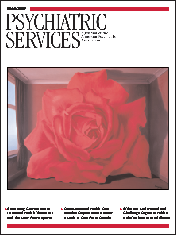To the Editor: The public health consequences of disasters are often thought of in terms of death toll, physical injury, and epidemics. However, the comprehensive view of health taken by the World Health Organization (WHO) (
1)—"a complete state of physical and mental well-being"—suggests that mental health requires postdisaster attention throughout the "disaster community" (
2), including the mental health of aid workers. However, the extent to which international nongovernmental organizations (NGOs) implement mental health programs remains unknown.
A survey was conducted to determine the extent to which international NGOs involved in health care provide comprehensive mental health care after emergencies or as part of development projects. Such care is defined as including a history of implementing mental health relief or development programs, the presence of within-agency mental health professionals, procedures for implementing disaster-related mental health services, and the availability of mental health services for staff.
NGOs were identified by using the United Nations' Web site (www.reliefweb.int). Data from NGO Web sites were compiled between June and July of 2004. Agencies were eligible for the survey if their Web site was in English and their mission was consistent with providing health care-related services that could reasonably be expected to encompass mental health. Of 196 NGOs with an English-language site, 119 were included in the analysis.
Fewer than half of the surveyed NGOs (55 agencies, or 46 percent) reported engaging in mental health programs. Among these 55 agencies, 47 (86 percent) had engaged in at least one long-term mental health development project, 16 (29 percent) had launched at least one emergency mental health relief program, and 11 (20 percent) reported both development and emergency programs. Twenty-six of the 119 NGOs (22 percent) indicated that they used mental health professionals. It is thus unclear how programs at the 55 agencies were staffed. Twelve NGOs (10 percent) reported existing protocols in emergency or disaster mental health response. Of the 119 NGOs, eight (7 percent) reported that they provided mental health support for their own staff or volunteers. Only four NGOs (3 percent) met the ideal of having a comprehensive international mental health care program as defined above.
These findings suggest that the emergency and long-term mental health needs of stricken communities worldwide, as well as the emotional needs of humanitarian aid workers, receive inadequate attention from NGOs as part of their health-care-related efforts.
A major limitation of this study was its reliance on Web sites as a primary information source. Future studies should seek to elaborate on these findings by more in-depth collection of information, including in-person interviews or mailed surveys. Given the literature on the short- and long-term mental health impact of disasters (
3) and WHO's broad definition of health, future studies should also focus on identifying both the mental health care needs of populations served by international NGOs and the obstacles that prevent NGOs from engaging in emergency and long-term mental health programming.

